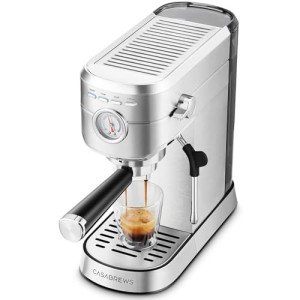Its History Of Energy-Efficient Espresso Machines
Energy-Efficient Espresso Machines: A Comprehensive Guide
Worldwide of coffee enthusiasts, espresso machines are frequently considered as necessary appliances for developing rich, fragrant coffee. However, the energy usage associated with these machines can lead to increased utility bills and ecological issues. As consumers become more eco-conscious, energy-efficient espresso machines have become a popular option. This article aims to check out the features, advantages, and options available in energy-efficient espresso machines, helping coffee enthusiasts make notified choices.
What Makes an Espresso Machine Energy-Efficient?
Energy-efficient espresso machines are designed to minimize energy usage while preserving optimum performance. A number of features add to the energy efficiency of these machines:
Insulation: High-quality insulation helps keep heat, minimizing the energy required to maintain optimal developing temperature levels.
Smart Technology: Many modern machines are equipped with programmable settings that allow users to set up developing times and change to standby mode when not in use.
Quick Heat-up Time: Energy-efficient espresso machines typically use advanced heating technologies, such as thermoblocks or PID controllers, to heat water quickly.
Low Wattage: Machines that operate at lower wattages take in less energy overall, making them more efficient.
Auto Shut-off: Automatic shut-off features make sure that the machine switches off after a specific duration of lack of exercise, more lowering energy waste.
Advantages of Energy-Efficient Espresso Machines
Buying an energy-efficient espresso machine can provide several benefits:
Cost Savings: Over time, lower energy usage can cause lowered electricity bills.
Ecological Impact: Using less energy lowers carbon footprints, making these machines a more sustainable choice for ecologically conscious customers.
Improved Performance: Many energy-efficient models likewise provide exceptional brewing technologies, resulting in better-tasting espresso.
Resilience: Typically, energy-efficient machines are built with high-quality elements, causing higher longevity.
Features to Consider
When choosing an energy-efficient espresso machine, a number of features ought to be considered:
- Type of Machine: Options include manual, semi-automatic, and totally automatic designs, each with varying degrees of user control and automation.
- Brew Quality: Look for machines that utilize high-quality brewing systems to ensure optimum flavor extraction.
- Upkeep: Some machines have self-cleaning functions that can conserve energy and effort in maintenance.
- Capacity: Depending on individual or family size, machine capacity can impact energy consumption, with larger machines often needing more power.
Popular Energy-Efficient Espresso Machines
The market offers a variety of energy-efficient espresso machines catering to different needs and choices. Below are some significant models:
Brand
Design
Secret Features
Energy Consumption
Breville
Barista Express
Integrated grinder, PID temperature level control, fast heat-up.
Low
DeLonghi
EC155
Compact size, simple to use, durable develop.
Moderate
Rancilio
Silvia
Heavy-duty style, excellent temperature stability, and has a low ecological impact.
Moderate
Gaggia
Classic
Trusted manual operation, long lasting brass elements, and efficient steaming capability.
Low
Jura
E8
Fully automatic, smart features, and a detachable brew group for simple cleaning.
Low
Tips for Optimal Energy Efficiency
Aside from choosing an energy-efficient design, consumers can adopt several practices to take full advantage of energy performance:
- Preheat: If your machine has a preheating function, use it to ensure that the optimum temperature is reached rapidly before developing.
- Switch off After Use: Always shut off the machine after developing or make use of machines with car shut-off functions.
- Routine Maintenance: Keep the machine well-maintained to guarantee it runs effectively and successfully.
Frequently Asked Questions About Energy-Efficient Espresso Machines
1. Are energy-efficient espresso machines more pricey?
While the preliminary investment might be higher for energy-efficient models, the long-term cost savings on electricity costs can offset the preliminary cost. Additionally, lots of energy-efficient machines come with innovative functions that boost the developing experience.
2. How do I understand if an espresso machine is energy-efficient?
Search for indications such as Energy Star certification, user reviews, and specifications regarding wattage and heat-up time. Machines with specific functions focused on minimizing energy usage are generally designed for much better efficiency.
3. Can Buy Espresso Coffee Machines use an energy-efficient espresso machine for other coffee designs?
Lots of energy-efficient espresso machines provide adaptability, permitting users to brew various coffee designs beyond espresso, such as lattes and cappuccinos, by integrating steaming capabilities.
4. Do energy-efficient models compromise quality for effectiveness?
Not necessarily. Numerous energy-efficient espresso machines are geared up with high-quality brewing innovation that can enhance flavor extraction while reducing energy intake.
5. What maintenance is needed for energy-efficient espresso machines?
Regular maintenance includes cleaning up the machine, descaling when essential, and occasionally inspecting seals and gaskets to guarantee ideal efficiency and energy efficiency.
Energy-efficient espresso machines represent an ideal mix of performance, cost savings, and ecological obligation. By thinking about numerous features, advantages, and brand names, consumers can select a design that suits their unique choices while contributing positively to the environment. As the pattern toward sustainable living grows, the popularity of energy-efficient devices, consisting of espresso machines, is most likely to continue its upward trajectory, offering coffee fans a guilt-free way to enjoy their everyday dosage of espresso.
